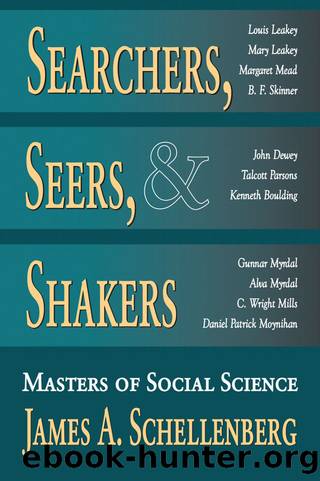Searchers, Seers, and Shakers by James A. Schellenberg

Author:James A. Schellenberg [Schellenberg, James A.]
Language: eng
Format: epub
Tags: Social Science, Sociology, General
ISBN: 9781351491730
Google: 9JcuDwAAQBAJ
Barnesnoble:
Publisher: Routledge
Published: 2017-07-28T01:59:55+00:00
A Solid Base in Economics
Kenneth Bouldingâs teachers had quickly identified him as an unusually promising student of economics. He showed himself to have a critical mind about central ideas in the field by questioning in print the views of his well known professor at Chicago, Frank Knight. In response he received Knightâs admiration and also serious recognition among other economists who read their published exchange. During his brief time at Harvard, he discussed key ideas freely with Joseph Schumpeter, one of the worldâs most famous economists. He was clearly a young economist to watch.
Bouldingâs first book project was a general work in economic theory. In this he focused on the dynamics of the business firm in achieving an equilibrium within the larger framework of the economy as a whole. Its title was to be Investment and Production: The Theory of a Single Economic Process. Unfortunately, he was unable to find a publisher for this work.
Boulding then began his textbook, Economic Analysis, which established his fame. In this work he applied a fresh approach to the field, organizing the subject around tools of analysis. He started with the basic concepts of supply and demand and applied them to simple cases, then he introduced more complex variables into the framework. He also included some of the latest economic ideas then entering the field. All in all, it was a summary of what he had learned about economics, presented in a form that could be readily grasped by a beginning student.6
A more technical work by Boulding came out in 1950 under the title of A Reconstruction of Economics. In this he attempted to present some of his most original ideas. He focused especially upon a theory about capital formation and maintenance, which led him to view consumption in a manner different from that of most economists. He expressed his key point in this way:
Once the emphasis is laid on assets rather than on income it becomes clear that there is a vital distinction between the enjoyment of assets and their consumptionâthat is, destruction. Consumption, and therefore production and income, are then seen as quantities to be minimized rather than to be maximized in the interests of maximum enjoyment.
In other words, the primary aimâboth for the firm and for society as a wholeâshould be the enhancement of assets rather than their consumption. This was an idea which he carried further in later work beyond economics in which he posed the interests of environmental preservation (for what he came to call âspaceship earthâ) as opposed to those of maximum economic growth and development. Clearly, Boulding was searching for economic tools that would serve human ends other than a simple desire for enhanced production or âprosperity.â7
In this book and in other writings Boulding put forward what he called his âbathtub theorem.â Drawing on a basic conception of John Maynard Keynes that the accumulation of capital at any point in time is equal to its production minus consumption, he suggested that one might conceive of capital assets as a body of waterâsuch as in a bathtub.
Download
This site does not store any files on its server. We only index and link to content provided by other sites. Please contact the content providers to delete copyright contents if any and email us, we'll remove relevant links or contents immediately.
| Africa | Americas |
| Arctic & Antarctica | Asia |
| Australia & Oceania | Europe |
| Middle East | Russia |
| United States | World |
| Ancient Civilizations | Military |
| Historical Study & Educational Resources |
Cat's cradle by Kurt Vonnegut(15339)
Pimp by Iceberg Slim(14489)
4 3 2 1: A Novel by Paul Auster(12377)
Underground: A Human History of the Worlds Beneath Our Feet by Will Hunt(12090)
The Radium Girls by Kate Moore(12019)
Wiseguy by Nicholas Pileggi(5771)
The Fire Next Time by James Baldwin(5432)
Perfect Rhythm by Jae(5398)
American History Stories, Volume III (Yesterday's Classics) by Pratt Mara L(5301)
Paper Towns by Green John(5181)
Pale Blue Dot by Carl Sagan(4996)
A Higher Loyalty: Truth, Lies, and Leadership by James Comey(4955)
The Mayflower and the Pilgrims' New World by Nathaniel Philbrick(4495)
The Doomsday Machine by Daniel Ellsberg(4485)
Killers of the Flower Moon: The Osage Murders and the Birth of the FBI by David Grann(4443)
The Sympathizer by Viet Thanh Nguyen(4385)
Too Much and Not the Mood by Durga Chew-Bose(4338)
The Borden Murders by Sarah Miller(4315)
Sticky Fingers by Joe Hagan(4189)
